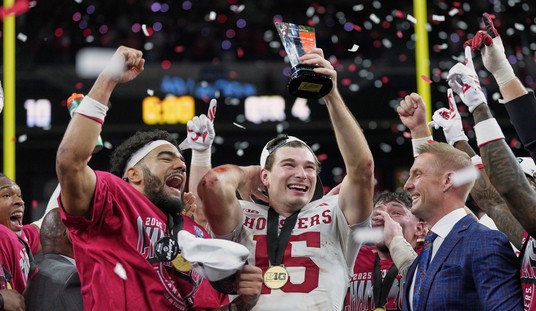The words “socialized medicine” and “universal health care” have very different effects on one’s heart rate, depending on one’s politics.
If you call yourself a “liberal” or a “Democrat” the words create an uptick in the heart rate that feels remarkably like the first giddy surge of middle school amore. Splurp, plup! goes the heart, and the world is a beautiful place. “Every person will be insured! Every medical need will be addressed! Oh, look! Daisies and puppies! Yay!”
If you call yourself a “conservative” or a “Republican” the heart rate still ticks up, but the giddiness comes from a lack of oxygen as one contemplates the hand of Big Brother reaching into the chest cavity and giving the old pumper a good long squeeeeze. “Every person will be insured? Every medical need will be addressed if you survive the waiting list! Oh, look! The Four Horses of the Apocalypse, and politicians riding every one of ‘em! Nooooo!”
Both reactions are extreme, of course, but it is worth noting that the daisies and death-horses are only six months away from becoming permanent fixtures in our lives. It happened without any particular clamoring — yae or nae — on the part of a populace enjoying nearly two decades of essentially full employment, with majority participation in employer-sponsored health insurance programs.
Beyond a sense that health care in general is a good thing and people should have it, notoriously unwonky Americans seem not to have been paying strict attention to the issue. In October 2007, Americans told Gallup that health care reform was important, but hey, any old plan would do. Writing for the Cato Institute, Michael Tanner noted:
[The poll] showed more than half of Americans support every suggested health care reform, from the most market-oriented policies to total government control, even when those policies were mutually exclusive. More than half of voters said yes to a government-run single-payer system. But an even larger majority — more than 77 percent — favored “reducing government regulation of insurance.” [emphasis mine]
So, Americans are largely incoherent on health care. We would like a government-controlled program, unregulated by government, please. The stories from Canada and the UK sound troubling; the stories from France sound more reassuring. We’ll have what they’re having, but with extra choices on the side, because we’re Americans!
Tell the truth: when you should have been pondering government and private-sector health care proposals in anticipation of this day, you were watching Dancing with the Stars. You can admit it — everyone else was, too — but it might be time to start paying attention, because incoherence coupled with recent feelings of economic insecurity may not translate into a levelheaded vote. Then again, it may not matter. In his column, Tanner gives bare outlines of the proposals being talked up by Senators McCain and Obama and writes:
It’s anybody’s guess how [McCain’s and Obama’s policies will] develop. But as November approaches, voters will reach a fork in the road, and as Yogi Berra says, they’ll take it.
Some time after Labor Day, many Americans will start to focus on the November elections, and they’ll be surprised to learn that while they were at the mall, government-run health care moved from being a vague idea to an essentially “done deal.” In just eighteen weeks Americans will, with every vote, submit to the idea of the government — that master of mismanagement — having a formidable control over their health care. Logic dictates that the common realities of age and illness — which come to us all — will steadily endow the government with ever-increasing authority over life choices and inevitable intrusions into decisions that should be private.
Once the thing is put into motion, there will be no pulling back. American presidents may peacefully surrender their power, but bureaucrats never do.
It may be too late to wonder — at this eleventh hour — if the free markets, local communities, and our elected officials have really done all they could to develop creative insurance alternatives to the super-sized government “solution” that will quickly affect our economy and slowly erode our freedoms. Will we look back and ask, perhaps naively, why citizens lacking work-connected health insurance could not have simply bought into the same or similar plans that covered state employees? If low-income families found the premiums too dear, might they not then have been able to use a tax-credit or deduction to offset that cost?
After taking the intractable step of handing our choices over to lawmakers and legislators who lately get almost nothing right, will we wonder why we did not encourage professionals and organizations to pool their resources and design flexible insurance plans with affordable rates.
Perhaps we’ll look back and realize that our own hobbies or fraternal associations or cottage industries could have organized and crafted insurance policies into which the similarly situated, but under-insured, might have participated. Could NRA members have purchased health insurance through the NRA, Greenpeace members through a shared Greenpeace plan? Why did we not consider a Southern Baptist health insurance plan that members could pay into? Why couldn’t the Masons, the Elks, the Knights of Columbus, or even large “internet communities” have consulted with insurance companies to create nationwide member health insurance programs and supplementals that were affordable in their spheres?
We cannot say we were not warned. For more than 15 years politicos and media folk have asserted the need for government-managed health care, until their drone became little more than background music to our daily waltzes. But knowing the government wanted to mandate health care coverage for every citizen, perhaps Americans should have taken some time to investigate exactly who the “millions of uninsured Americans” are; many of them are young adults choosing to opt out of coverage. Perhaps we should have attempted to first demonstrate that the government could successfully serve the uninsured minority, before subjecting the entire nation — and a large chunk of the economy — to an untried program.
Instead, too late, we’re looking up from Dancing with the Stars just in time to see the Federal Jug Band introduce a new caller, and he’ll be telling us to step lively to their endless tune.
Well, after all, dancing is good for the heart.









Join the conversation as a VIP Member